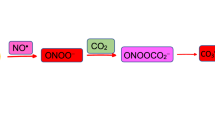Abstract
Reactive oxygen species are continuously generated during oxygen metabolism, and a measurable amount of oxidative DNA damage exists in aerobic organisms. By the determination of Fpg-sensitive sites in mammalian cells in culture, we assessed the background level of oxidative DNA damage and its potential increase by extracellularly applied complexes of iron(III). In V79 Chinese hamster cells the endogenous level of Fpg-sensitive modifications is detectable, but the extent is much lower as compared with results derived from other analytical methods. In V79 cells, the frequency of Fpg-sensitive modifications is considerably enhanced by Fe-NTA in a time- and dose-dependent manner, while no increase is observed after treatment with Fe-citrate. These results indicate that the ability of transition metals to generate oxidative DNA damage in intact cells strongly depends on factors like uptake and intracellular distribution, which will affect the intracellular availability of redox-active metal ions close to critical targets.
Similar content being viewed by others
Author information
Authors and Affiliations
Rights and permissions
About this article
Cite this article
Hartwig, A., Schlepegrell, R. & Beyersmann, D. Analysis of metal-induced oxidative DNA damage in cultured mammalian cells. Fresenius J Anal Chem 354, 606–608 (1996). https://doi.org/10.1007/s0021663540606
Received:
Revised:
Accepted:
Issue Date:
DOI: https://doi.org/10.1007/s0021663540606




